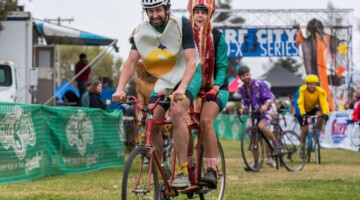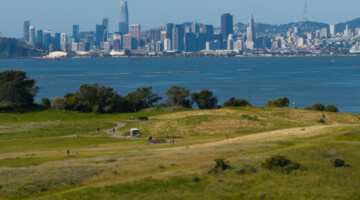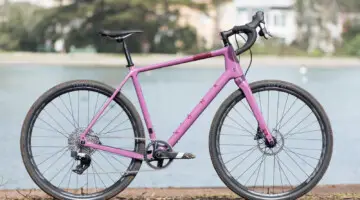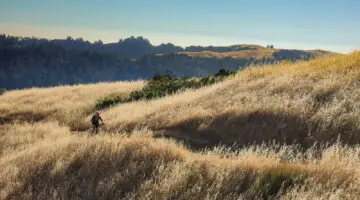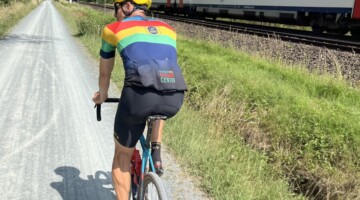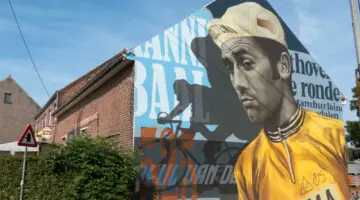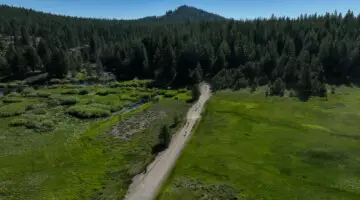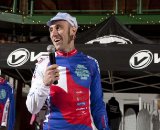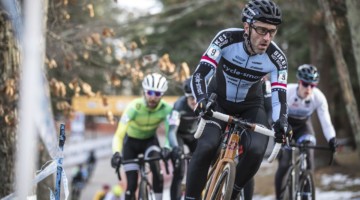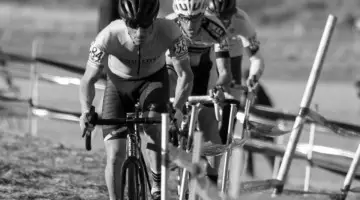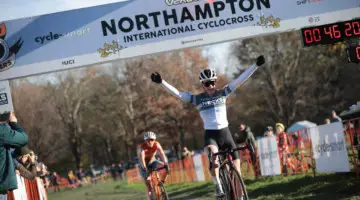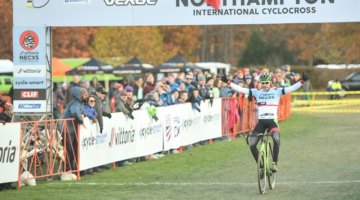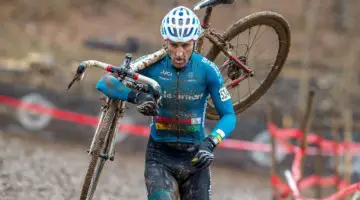Adam Myerson is a bit of a cyclocross legend, especially on the East Coast. In fact, Cyclocross Magazine publisher Andrew Yee distinctly recalls Myerson’s presence at his first race, and years later, Myerson is still a fixture in New England cyclocross and beyond. With an impressive set of palmares (for example, the 2010 Tennessee State Cyclocross Championships and Verge Overall Series) that come from 25 years of bike racing, he is certainly an elite force to be reckoned with, even as some of his contemporaries abandon the Pro field for Masters races. Still, as Myerson (and his latest tattoo) will tell you, he lives by the motto “Can’t Stop, Won’t Stop.”
With back-issues of Cyclocross Magazine and coffee cups in hand, Myerson’s road team, Team Mountain Khakis, and I came up with a list of questions we wanted to ask their team manager. After reading the feature article on him in Cyclocross Magazine Issue Five from Winter 2009, we had quite a bit of food for thought.
The next day, Adam and I sat down for a long chat about his many cyclocross-related positions, ranging from elite racer to coach to manager to race organizer and promoter to team captain. It’s a busy life, but someone’s got to do it.
Cyclocross Magazine: Your team came up with this first question. What would Adam Myerson ask Adam Myerson?
Adam Myerson: Wait, this is set up so I have to talk about myself in the third person, which I am loathe to do.
CXM: OK, what would you ask yourself?
AM: I’m actually quite sick of reading about myself and hearing about myself and I’m surprised there isn’t more “Adam Myerson fatigue.” I’m actually sure there’s a fair bit. So I don’t have any questions for myself: I’m tired of hearing myself talk, and I imagine everyone else is too.
CXM: Well, we’re glad you’re talking to us now. So what are your goals for the upcoming season?
AM: Good question. Team Mountain Khakis is right now trying to make an effort to be one of the first continental teams to have a full cyclocross program and we’re working on that right now with Mock Orange bicycles and Ridley as our sponsors. I’m sure people have noticed that we hired a bunch of strong ’cross riders for the road season and now our goal is to keep that together. And if that happens, I’ll plan to do a slightly more national schedule than I have in the past. I’ll certainly be focused on the new New England Pro ’Cross Series and unfortunately we have one conflict there with the USGP but otherwise I’ll try to get to the other three USGPs. I think it would be hard for me to improve on my results from last year and so, as always, my goal is to maintain that level if I can and look for courses that suit me and good opportunities and not to be much more ambitious than that.
CXM: What happens to Cycle-Smart if you race for Team Mountain Khakis?
AM: The Cycle-Smart grassroots team now has 50 plus riders all over the country and is much bigger than just me racing in the Cycle-Smart kit, so the team won’t go away. Justin Bristol has done a great job of managing the team, so our goal there is to keep all our sponsors involved and keep that program alive. I have to assume that at some point I’ll be back on my own team.
CXM: What is this New England Pro ’Cross Series?
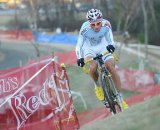
Adam Myerson battles it out on and off the race course for the Verge NECCS ©Natalia Boltukhova | Pedal Power Photography | 2010
AM: Because of the banning of the Verge series, this is a new series that consists of some Verge series races and some races that are outside of the Verge series, but it’s a new collection of four weekends of racing, it’s a national level series that’s approved by the UCI. It’s Providence, Gloucester, Northhampton and Warwick. Our goal here is to have an international level series.
CXM: What are your thoughts about Nationals moving to January in Madison?
AM: That’s two separate questions there. I’ve always been in support of moving the date to January. I think there are lots of regions in the country that are already racing in January and moving the season up into August is not a great idea, it’s not ’cross weather, it’s not what we’re looking for. But the only way to loosen the belt on the season and resolve some of these conflicts with races is by having more weekends, and those weekends have to come in December and January. So by moving nationals out to January, you’re extending the season for a lot of people, and you will get better attendance at those later races and get some different conditions. That said, I don’t know that Madison is the ideal place for us to be racing in January. I know a lot of people want to blame USA Cycling for that, but there were only two towns for them to choose from. If people want to see a warm weather January nationals, someone just has to step up and put the bid in. So I’m not excited to be racing in Madison. Madison’s a great city, I’m happy to be going there but if you look at the historic high and low temps for Madison in January, it will definitely be extreme so I’m worried about the damage that’s going to do for the success of having nationals in January.
CXM: What is summer training like for you?
AM: Depends on what part of the summer you’re talking about. Sometimes I’m just recovering between road events. I’m balancing two huge goals, my road season is as important as my ’cross season, and I have to go well at certain times of the year. During the road season, I’m often just racing and recovering. When I have an extended window where I can take a break and build up a little bit, I’ll take days to do a training block. When it comes to focusing on ’cross, it looks like this year I’ll have my opportunity in August. I’ll be able to take the first three weeks of August and do a base block, which will take me into the first weeks of September.
CXM: So what is a base block for ’cross?
AM: For me, my training for ’cross is very similar to my training for road. It’s road miles, it’s mostly training on my road bike, it’s endurance and tempo paced riding, increasing my work capacity. It’s 30 plus hours per week. It’s very unspecific in that sense, but what I’m building is the depth of my fitness and the capacity of work that I can complete so when I do get into the start of the ’cross season, my form will get sharper by December just from racing and recovering and maybe training once mid-week. I want my form to last as long as possible, so even if I start September a little bit slow, if I start it with a broad enough base and depth of fitness, I will get sharper and last longer, and that’s essentially why I rode so well for so long last season.
CXM: Do you have any advice for new riders starting their preseason now?
AM: Definitely do not do what I’m doing. For a new rider, you want to spend as much time on your cross bike as possible and as much time in the woods on your ’cross bike as possible. Technique is going to be as important for a new rider as fitness. I suggest starting in August doing midweek ’cross workouts with a group. A good schedule would be to do skills practice by yourself on Tuesday, Wednesday would be a great day to do a group ’cross workout, essentially a training race, Thursday you could do a longer low intensity ride, a mountain bike ride on a cyclocross bike. Rest on Friday, then repeat some of those workouts on the weekend or race local road events on the weekend.
CXM: Will you ever be racing Masters in the next few years? Is that something you’ve thought about?
AM: I’ve stopped thinking about it. Mountain Khakis is planning on returning to UCI pro status next season and I will be resigning with the team and racing at pro level again next year, so for at least this cyclocross season and the following cyclocross season I will either not be racing Masters or will be a pro and ineligible to race Masters. But at this point what I’ve decided is that as long as I am competitive in the Elites and capable of scoring points in UCI events, I want to race at the highest level that I can be competitive. And I would actually issue a challenge to many of the other high-level Masters who are out there right now concerned about Masters World Championships and things like that. If you really want to satisfy your own ego, stop winning Masters races every weekend. Step out of the Masters and into the Elites and race at the highest level that you’re physically capable of. That’s the choice that I’ve made for myself and a challenge that I would like to issue to others as well. I would rather be the highest ranked 40 year old on the UCI points table than Masters World Champion. For me, the Masters World Champion is the highest ranked 40 year old.
CXM: If you had to give yourself a “job title” right now, what would it be? You do so many things!
AM: I am responsible for so many different things, it’s hard to put it under one job title. Ringmaster? Ringmaster works because for Team Mountain Khakis, I’m the captain on the road so I’m still racing at the Elite level as the captain of a team, so I’m doing all of the training required to race at the NRC level, I’m in charge of looking after all the kids and leading them in the races, but I’m also the team manager right now. So I’m also part of the management team of Premier Sports Partners, which is the managing organization behind Team Mountain Khakis. I have desk work that I do for the team, which means booking the hotels, hiring the riders, getting the entries done, making travel itineraries, doing a certain amount of administrative work that goes with running the team and also consulting with the owners of the team to plan the direction of the team and work on sponsorship. So I have an on the bike and off the bike job with Team Mountain Khakis. And I would say that’s about 50% of my workday. The other 50% is Cycle-Smart related, and that means coaching the athletes that I’m personally responsible for, it means doing the billing and accounting for the seven coaches that work for Cycle-Smart, reading the coaches’ reports and advising them on any issues they have, so coaching the coaches. So everything that goes into running a small business is my responsibility. Also, all of the events. We have the Verge series, we have the New England Pro series, we have Cycle-Smart International in Northhampton, we have Nor’Easter Cross now in Burlington, Vermont. So I’m working on all of those things all year-round, maybe just once a week. But it’s a full day, all day, everyday.
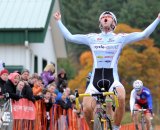
Adam Myerson (Cycle-Smart) gets his first-ever UCI win © Natalia Boltukhova | Pedal Power Photography
CXM: How many hours a day, counting training, would you say you work?
AM: I have a flexible schedule but I am almost always “at work.” It means I can stop and take a nap in the middle of the day but it also means I work until midnight almost every night. I typically am checked in for 12 hours a day, at a minimum, every day. There are no weekends, there are no days off. A slow day for Mountain Khakis is a busy day for Cycle-Smart. I’m compulsive about being productive.
CXM: Now that I realized the three of us in the room were English majors, that reminds me: Mark Vareschi said in his interview that being good at writing was as important for the Rutgers team as being good at cycling. Do you think that your English major has helped you in the cycling industry?
AM: Absolutely. I took plenty of exercise science classes in college because I wanted to be a better bike racer. And so even though I thought long term my goal was to be an English professor and go to grad school and focus on that, bike racing obviously took me off that course. People major in English for a lot of different reasons. For me, studying literature was about studying human beings and human situations and human behavior. For me, it’s about people. Literature is about knowing people, understanding people, being able to do critical analysis of people and their decisions and their choices, and to be able to write about them. I think that allows me to be someone with a lot of empathy, and that empathy has to exist if you’re trying to coach an athlete. You need to hear the sound of fatigue in their voice as well as the science of how to get them out of it or what kind of training that they need to do. You need to be a good friend and life coach as well. So the ability to read people and communicate effectively with them through speaking and writing has helped me as a coach, helped me get sponsorship, helped me get hired for jobs. In the post-internet period, it’s helped other people find out who I actually am. I think their perception in the 90s was much different from me in the 2000’s and onward because I was able to communicate more about who I actually was.
CXM: Would you ever write a book?
AM: It’s crossed my mind, and in fact, I’ve already signed a book deal to do so earlier this year. We haven’t started writing yet but I was offered a contract earlier in the year, and sometime soon I’ll sit down and start writing. The gist of the book is sort of: “how did I get here?” “where did I come from?” “how did I end up in bike racing?” and “what formative things happened to me along the way?” If I can use my storytelling ability and my perspective on life and on bike racing to go back and tell some of the strange stories and interesting things that have happened along the way with 25 years of bike racing, I hope people will be interested in those stories.
CXM: I think they will.





